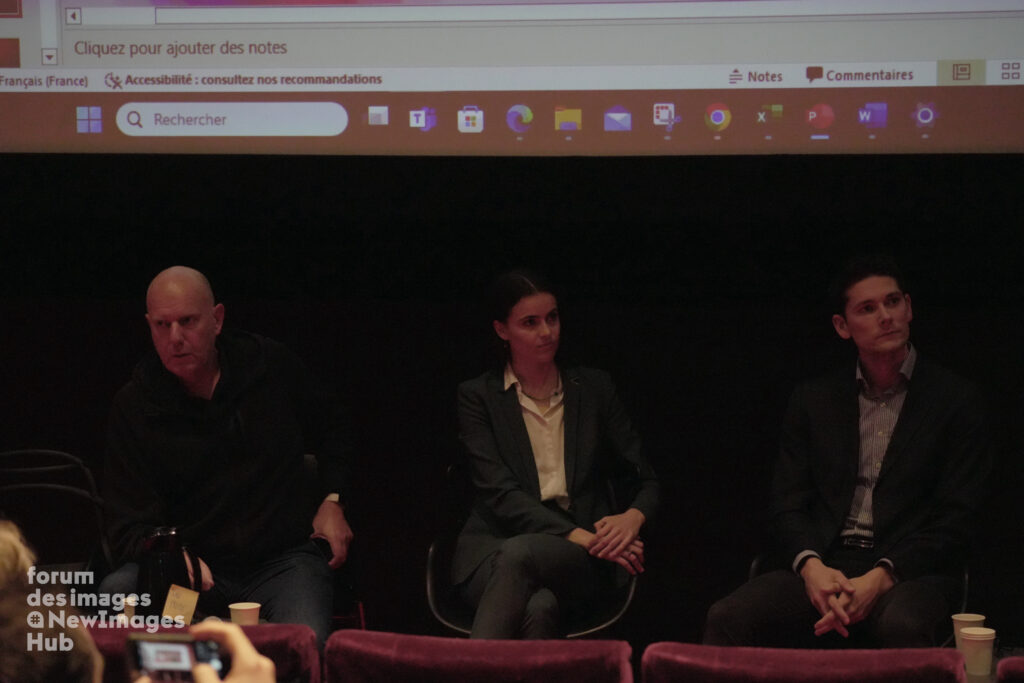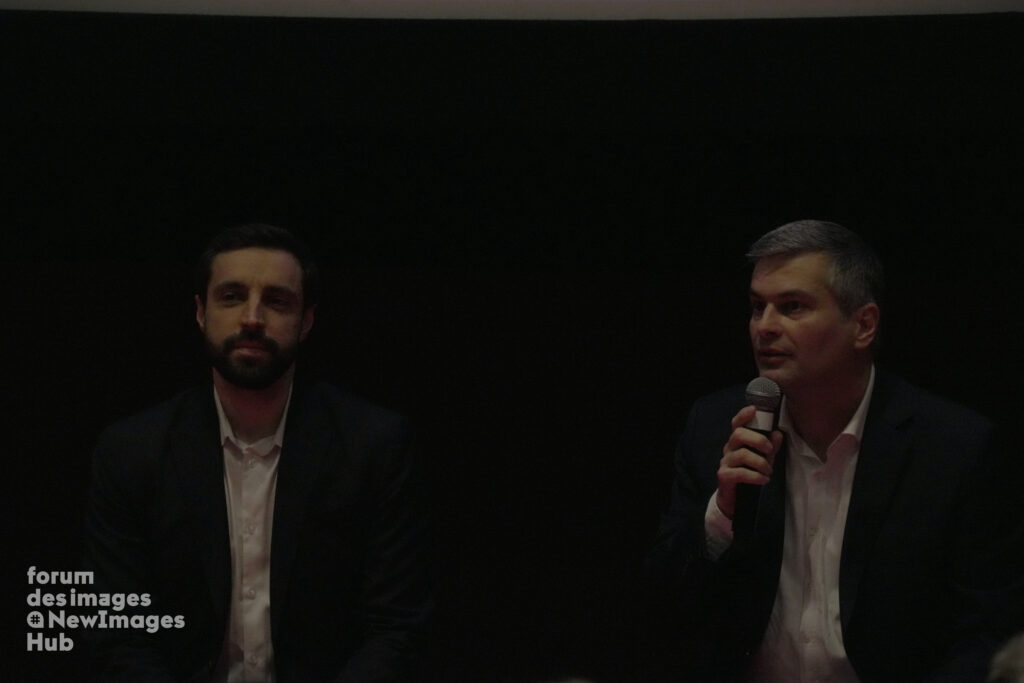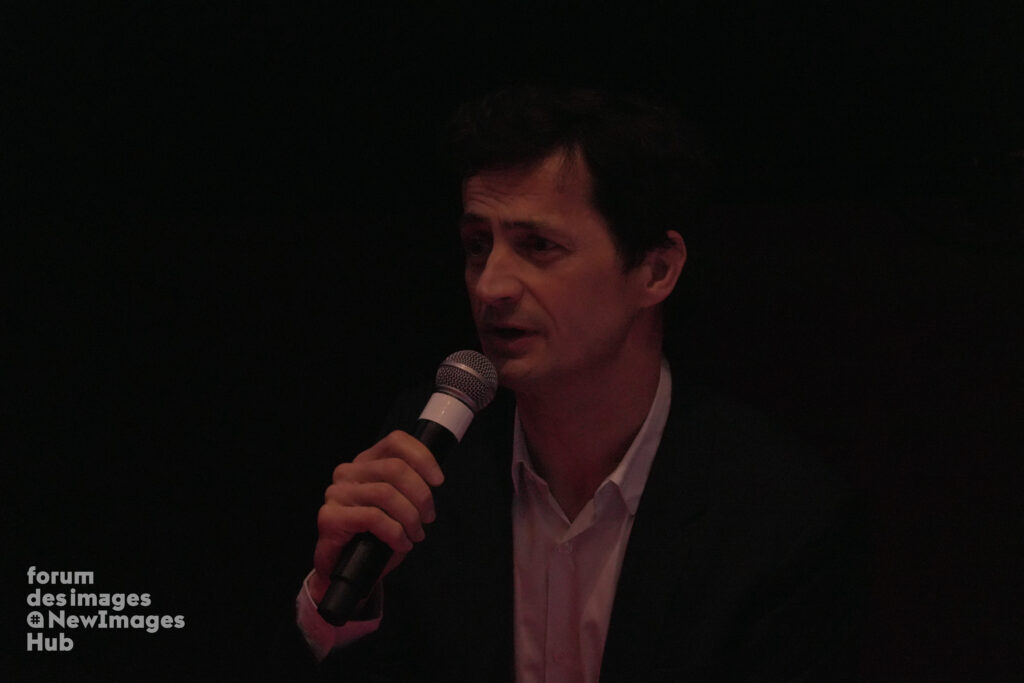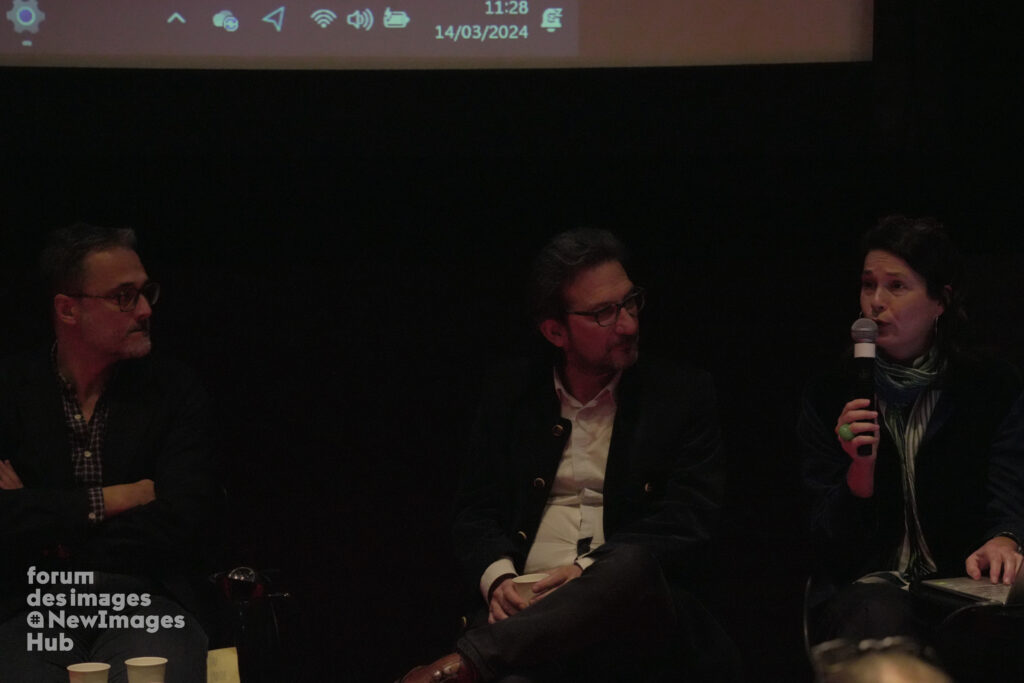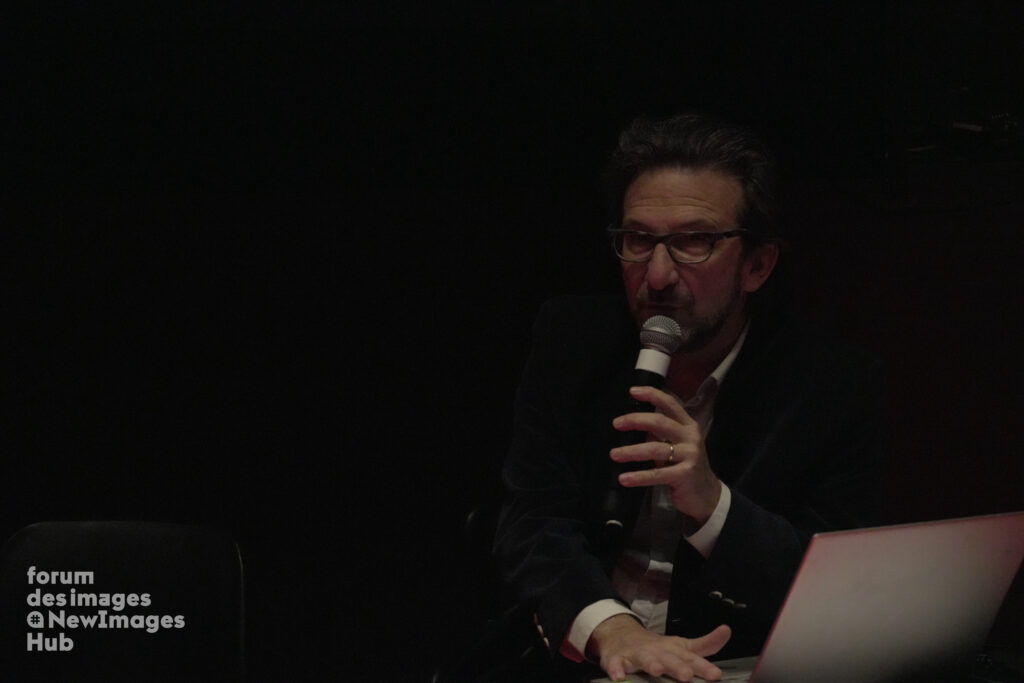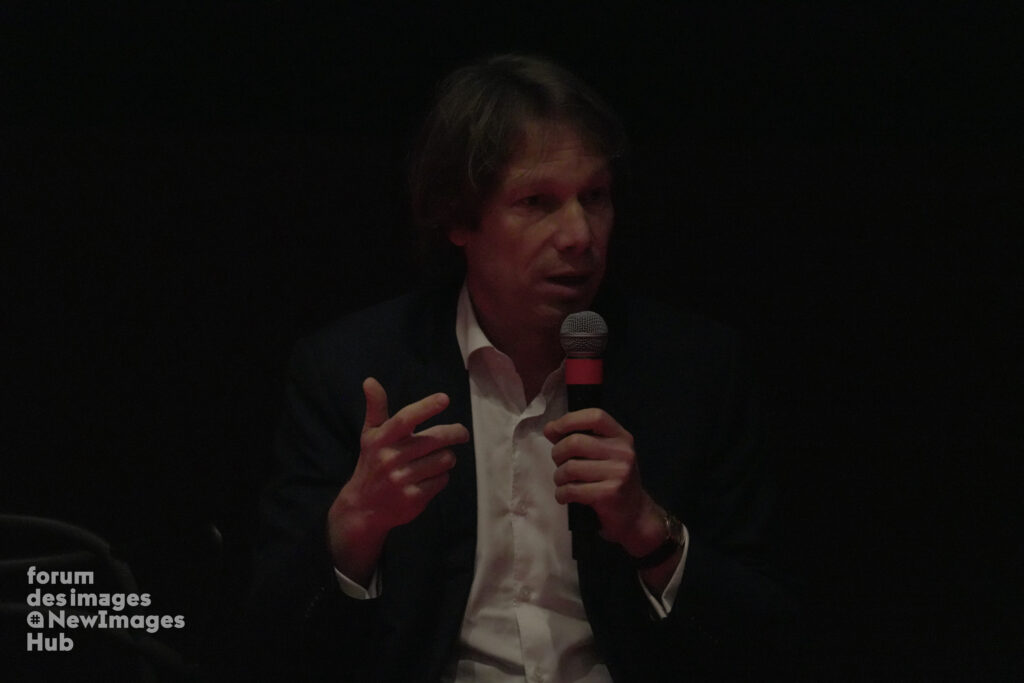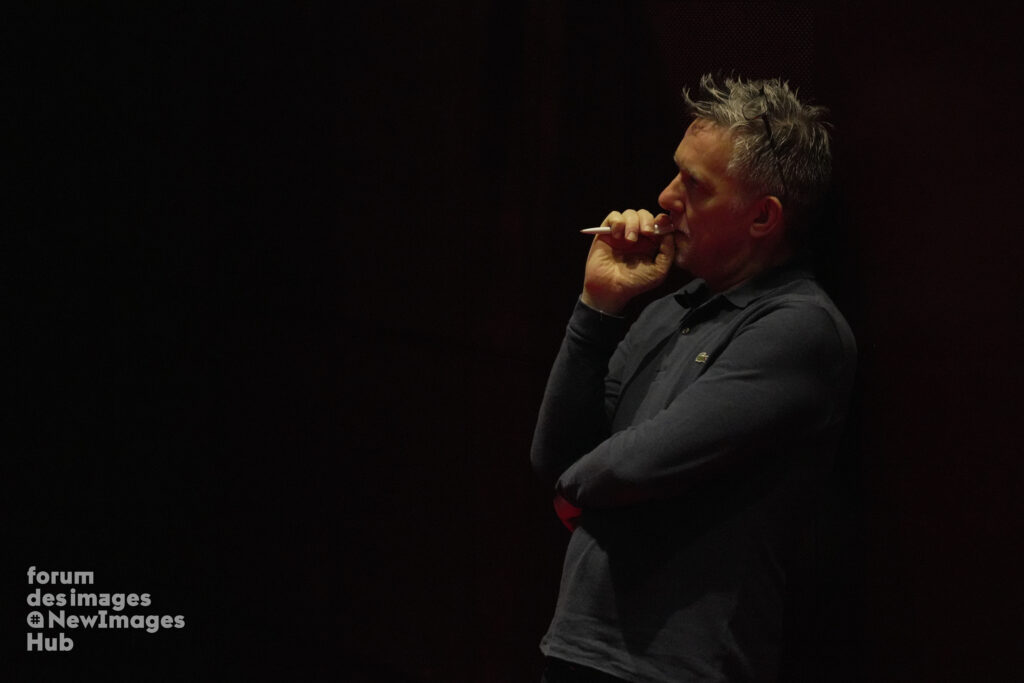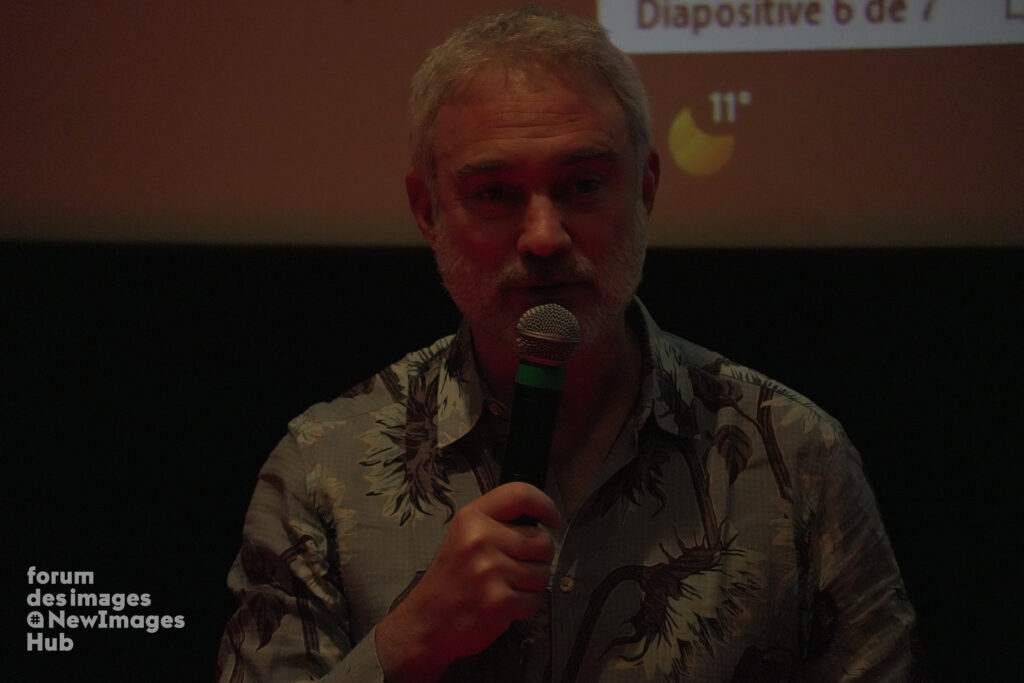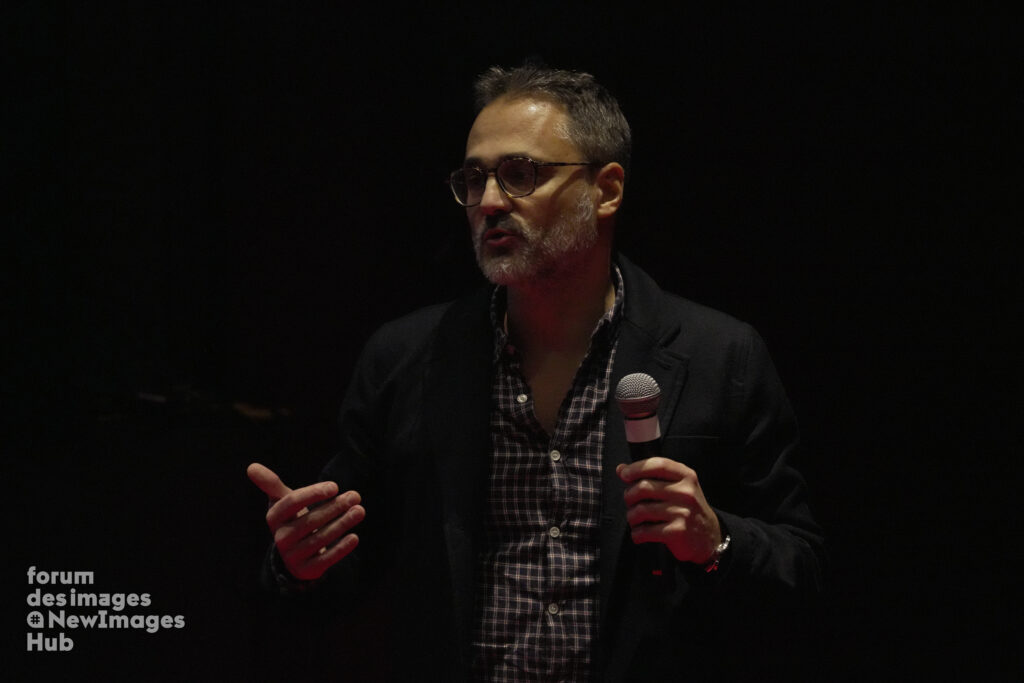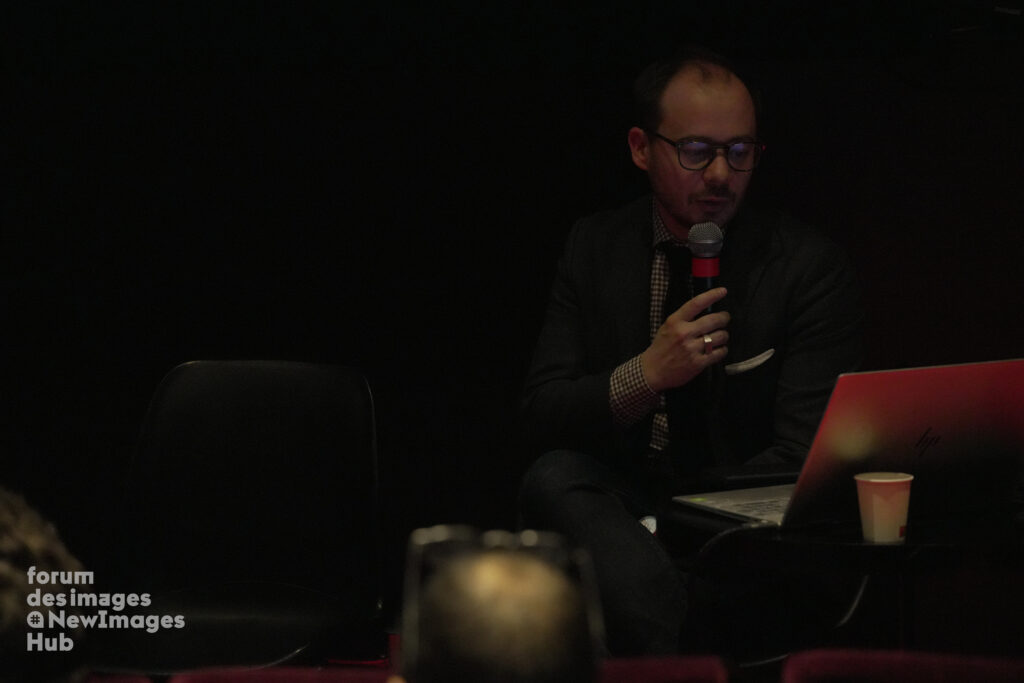Fourth and last edition of the think tank «lieux culturels et métavers»
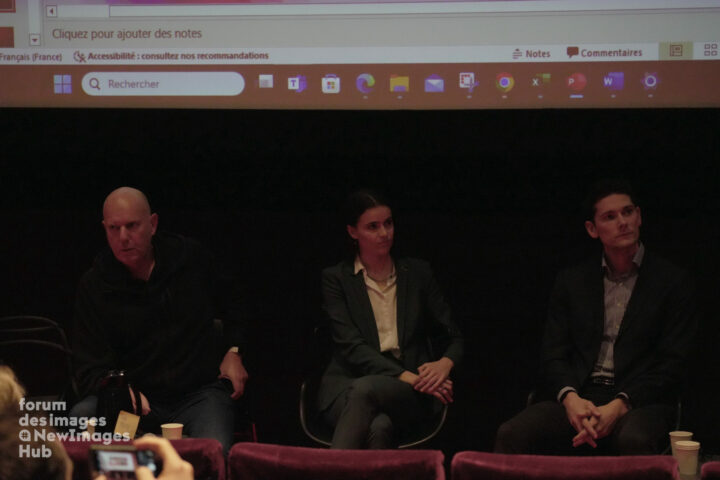
A NewImages Hub & CLIC project
On March 14, 2024, the Forum des images hosted the fourth and final session of the «Museum Metavers» Think Tank, co-hosted with CLIC, questioning existing business models for metavers and (pre)metavers or immersive virtual world projects, as well as a legal and ethical focus on their creation and use. If you missed the third Think Tank session, feel free to read the report here!
As a reminder: the «lieux culturels et métavers» think tank is a series of 4 working groups inviting museums, cultural venues and historic monuments to work together to imagine the future of cultural institutions in the metaverse.
«The idea of the think tank, co-piloted by the Forum des images and the CLIC, is to create a crossroads between cultural institutions and French tech companies» – Michele Ziegler
Which uses for which audiences? What are the obstacles to adopting these technologies? How accessible are they? How to engage audiences?
How can we generate revenue from the metaverse? Can metavers be profitable for institutions? A new model for content development and audience loyalty? What do we need to know about copyright, IP and consumer law?
With over 70 institutions and companies having already agreed to take part in the Think Tank, its aim remains to prepare French cultural institutions and venues for the call for projects just published by the Ministry of Culture, France 2030.
The morning ended with a presentation of the «Immersive Culture and Metavers» AAP, launched by the Government on Tuesday January 30, 2024, as part of France 2030. Operated by Bpifrance, the call aims to develop the production and dissemination of immersive experiences, in the service of cultural democratization and audience expansion. The first application deadline is July 2, 2024.
Business models
During this 4th session on March 14, representatives of projects linked to metaverses or immersive virtual worlds presented their views on business models:
Philippe Bornstein, President and co-founder of XR+
XR+ (par The Lucid Dreams Company), founded 4 years ago in Caen and Paris, offers a destructive approach to the creation of immersive VR or 360° experiences, with no developers and no code. With a reasonably priced license (€100 per month for professionals) and over 18,000 accounts today, XR+ makes the XR Web accessible. The uses for these immersive experiences are varied, ranging from marketing and culture to the arts.
XR+ does not yet offer a metaverse experience, but is involved in discussions on future business models for metavers (immersion with a social character, living together while being embodied or not, to interact with others…).
For Philippe Bornstein, the immersive experience must add value for the user, to keep him or her engaged in the experience. For metavers, it’s a question of conversing, of humanizing the digital world with an exchange in natural language (voice) with an avatar, a 3D chatbot, who can understand and respond to the user (with a defined corpus of documents, for example). Instead of talking to a text chatbot, I speak with my voice, and the exchange takes place with a humanized entity. This concept is what would enrich the public’s relationship with cultural venues.
For XR+, it’s a question of creating desirability, giving priority to contemplation and observation of the place or object, without replacing it with that of one’s telephone. To achieve this, multi-device accessibility (mobile, computer, VR headset, and tomorrow augmented reality goggles) seems particularly important to them, to give remote and on-the-spot access, without having to download anything or create an account.
We’re moving from advertising-based business models to paywall business models (with the example of news sites, with subscriptions, or soft paywall by encouraging subscription).
Hélène Quintin, Co-founder & President of Keru Project
Keru‘s mission ? To create a digital souvenir for cultural sites! Keru secures digital assets and donates the profits to fund cultural sites. Their first digital souvenir project, for the Musée d’Orsay, was released this autumn 2023, to coincide with the «Van Gogh à Auvers-sur-Oise» exhibition.
Keru’s vision is not directly linked to the metaverse (at least not in the short term), but will be a source of funding for its partners, and will help create a link between the physical and the virtual.
These digital souvenirs, which can be collected from various religious sites, are linked to the physical world in that they enable visitors to take away something from their visit. By scanning a QR code (during the visit or at the end), it takes 15 seconds to obtain a digital souvenir, without any technical knowledge, to access exclusive advantages.
According to Hélène Quintin, in today’s fast-moving world, advances in AIs will make the creation of metavers much quicker and easier.
On the subject of the business model, Keru shares feedback from their digital souvenir for the Van gogh exhibition at the Musée d’Orsay:
The average basket hovered around a 20-euro souvenir, which gave secret benefits.
«Holders of digital souvenirs will also benefit from in-store discounts and a number of new experiences such as an invitation to an opening, dinner in one of the museum’s restaurants or, for the lucky ones, lifetime access to the museum for two!»
Jean-Nicolas Hinard, Co-founder of Wagmi studio
Wagmi studio is a Web 3 agency that supports and develops tools to promote their adoption by the general public, and is also positioned in the NFT field. An independent, profitable company with a team of 10, Wagmi studio has a wide range of customers and partners, including Orsay, the Arab World Institute, AGORIA, and the creation of an NFT for the French Post Office and the Red Cross.
For Jean-Nicolas Hinard, the metaverse does exist. How immersive are digital experiences? Today, it’s not yet conclusive. Headsets are not yet widely distributed, and the Vision Pro has yet to prove its worth…
But digital is slowly increasing the rate of immersion, so the metaverse has already begun! And digital not necessarily related to the physical… To illustrate, Jean-Nicolas Hinard cites a few figures: «The size of the crypto-currency market, in terms of transaction value, is USD 1,330.43 billion for the current year and a CAGR of 30.40% over the forecast period.» – MordorIntelligence
And this industry has no link to the physical, no use in the real world, just like many video games. «If digital tries to copy the real, we’ll get nowhere» – Jean-Nicolas Hinard
In his view, we need to embrace the digital, which extracts itself from the real, and embrace pixels and digital matter.
Today, digital works in silos and ecosystems, which could be harmful. For Wagmi studio, blockchain enables us to open up to other silos: in concrete terms, this translates into the museum experience, for example, by unlocking content, and linking up different institutions via shared, responsive content.
The key points of the metaverse therefore remain the link, between users and between ecosystems, to create a complementary synergy! Finally, we might conclude with this sentence from Philippe Bornstein on the recipe for a successful business model for metavers and interactive immersive worlds: «Transforming added value into added warmth, the extra soul that enables monetization, is the key to success!» – Philippe Bornstein
Legal and ethics
The Think Tank’s legal panel featured expert speakers:
Laurent Chrétien, Founder and Chairman of Komodal
Propelled by the Laval Virtual association, Komodal has rapidly become the leading provider of services in virtual worlds for training, remote collaboration and events.
Komodal offers companies a range of complementary services based on metaverses and virtual worlds. It offers its customers comprehensive support: strategic consulting, needs definition, acculturation and discovery, event operation and training.» – Laurent Chrétien
The metaverse exists thanks to the underlying technologies: blockchain, AI, and also takes on many different meanings, with blockchain metavers, 3D metavers… This natural evolution in web use, with increasingly powerful technologies, is multiplying metavers, which are still in their infancy. According to Laurent Chrétien, it is likely that within 10 years there will be billions of collaborative environments on the Internet, symptoms of a generational difference and of a new generation that wants to mix playfulness and work.
Legally, the development of these collaborative platforms presents different types of risk:
- Contractual and financial
- Personal injury
- Infringement of property rights
- Cybersecurity and behavior
- Technical and material
About ethics:
On environmental issues, and pure ethics, Laurent Chrétien is convinced that collaborative environments can provide real answers to climate change. Less travel, a huge reduction in office space, the preservation of historic sites, the liberation from work and more time with loved ones, or even the disruption of consumer society, are some of the points he raised to close this point!
Romane Sarfati, Associate General Manager of Manifesto Immersive, and Manifesto‘s Director of Strategy and Development
Manifesto is a group of cultural companies created in 2015, which develops artistic and cultural projects in the fields of creation, heritage and museums, in France and around the world.
They mobilize multidisciplinary teams, who create a diversity of projects, including visual arts creations, urban routes, artist residencies, events, or immersive experiences with manifesto immersive.
Manifesto Immersive, a subsidiary of the Manifesto group, is a production company for immersive artistic and cultural experiences. As experience designers, their immersive productions are often multidisciplinary, combining teams of authors, interactive and sound designers, and creative studios.
Indeed, the question of copyright is a complex one for Manifesto’s immersive experiences; contracts are drawn up in collaboration with the artist, and depend largely on the nature of the project. Working on a variety of production formats, the legal aspect can prove complex: immersive experience in situ? Virtual reality? What products, what financial considerations?
The key point to take away from Romane Sarfati’s presentation is that the support of a law firm should be considered from the outset of a project, whatever its nature, and especially if it is linked to virtual platforms, as this type of production involves extensive teams, varied skills and diverse creative elements.
Xavier Près and Vincent Varet, Founders of the law firm VARET PRÈS KILLY
Xavier Près is a lawyer with a doctorate in law, specializing in intellectual property law and the law of new technologies, information and communication (digital law). He was joined by his partner Vincent Varet, Doctor of Law and Associate Professor at the Université Panthéon Assas Paris II, who advises and litigates with major players in the private sector on all issues relating to intellectual property, particularly digital.
Here are a few legal points taken from their very precise and comprehensive presentation:
Today, there is still a lack of specific regulation for metavers / NFT, as these concepts are recent; but the law applies, even when there is no legal solution on the emerging technology concerned. «In the absence of specific regulations, solutions are created by transposing the rules applicable to the physical world.»
Some specific texts govern certain aspects of metavers, including:
- PACTE Act of May 22, 2019 on the growth and transformation of businesses (novel legislative framework on crypto-asset fundraising (ICOs – Initial Coin Offering or Initial Token Offering) and digital asset service providers (DASPs))
- Law n°2022-267 of February 28, 2022 aimed at modernizing the regulation of the art market (Modification of article L.320-1 of the French Commercial Code relating to public auction sales, by deleting the term «corporel», which limited such sales to tangible movables only).
- The MICA (Market in Crypo Assets) regulation of May 31, 2023, applicable from December 2024, which regulates the market in crypto-assets and crypto-asset service providers (PSCA).
- Proposed EU regulation on the AI Act and proposed French law of September 12, 2023 on the regulation of AI by copyright.
As far as platform obligations are concerned, those of French and European law overlap to some extent; the French legislator having partly anticipated the adoption of the RSN (of direct application in France since February 17, 2024). In the event of contradiction, the RSN takes precedence.
Similarly, the European DSA (The Digital Services Act), and RGPD (the European regulation on personal data protection) apply. If non-compliance is proven, platforms are not necessarily subject to obligations, but rather to hefty fines levied in proportion to sales.
Presentation of the «Immersive Culture and Metavers» Call for Projects by the French Ministry of Culture
To close the session, 3 speakers presented the «Immersive Culture and Metavers» Call for Projects to the institutional audience:
- Fabrice Casadebaig, culture advisor, General Secretariat for Investment
- Romain Dudognon, head of the digital sector at Bpifrance (implementing partner)
- Sebastien Thévenet, General Directorate for Media and Cultural Industries, Delegate for Cultural Enterprises at the French Ministry of Culture.
The Cultural and Creative Industries (CCI), representing 14 sub-sectors such as music, performing arts, architecture, design, visual arts, cinema, video games, publishing and the press, are essential and strategic for France and its economy.
FRANCE 2030 is the launch of an open, demanding and selective call for projects, to benefit from the State’s support in responding to the major challenges of our time, and steered by the General Secretariat for Investment.
FRANCE 2030’s key objectives include:
- Sustainably transform key sectors of our economy through technological innovation
- Bring France to the forefront of tomorrow’s cultural production, with greater sovereignty, while nurturing the talents of tomorrow
- Supporting the transformation of cultural players, particularly in the field of immersive content
For the part of the scheme that interests us specifically, the «Immersive Culture and Metavers» AAP, applications will close on July 2, 2024 for wave 1.
One of the important dates to remember will also be that of the 10th Entreprendre dans la culture national forum, from June 11 to 13, 2024 at the École nationale d’architecture de Paris-Belleville. With the 3rd day of the forum dedicated to France 2030, participants will be able to find out about feedback from prizewinners, how to build a good bid and how to get support.
Presentation of missions and types of assistance
The aim is to protect European strategic assets, including immersive assets. The AAP aims to encourage the emergence of projects, and to act effectively by protecting and supporting national players at strategic points in the value chain.
France is one of the most advanced ecosystems in terms of production studios, but the sector is handicapped by a lack of exploitation and distribution of immersive content, and our technologies are frequently taken over by non-European players.
Two types of assistance (grant format) will be launched to support project leaders: assistance with project realization, for technological development or solutions for distribution and exhibition spaces, valorization, and multi-link projects. This support does not apply to pure infrastructure projects, or to the creation of new works. The second type of engineering support targets projects aimed at identifying all the technical, legal or economic obstacles to project development.
Eligible expenses
Several types of expenditure are eligible, including personnel costs, equipment, subcontracting and buildings. As mentioned above, «projects for the creation of works are not eligible. However, production and creation costs may be taken into account, provided they represent less than 50% of the total budget of the investment project, and serve as a demonstrator for a later eligible project». – Bpifrance
How to apply
Applications must be submitted on the Bpifrance website, at this address! From the submission deadline on July 2, a pre-selection process will take place, with an initial notification of audition or refusal in October 2024, followed by a notification of passage to appraisal or refusal at the end of November, and finally a final financing decision 3 months later.
To maximize your chances, you’ll need to read a self-supporting set of specifications, as well as an application file template, a FAQ to come on bpifrance.fr, and finally, a contact e-mail address made available as a privileged interlocutor: aap.france2030@bpifrance.fr
«Thank you to the French government for choosing bpi as operator of the scheme, and thank you to the institutions, who will fill in and build the cultural immersive chain!» – Romain Dudognon
Questions and answers
Can an association be a project sponsor?
Yes, any legal structure that is part of an entrepreneurial structure (business plan, legal structure, etc.) can be.
Who is the jury of experts studying the applications?
The jury will be made up of external experts from all sectors, not yet validated, with profiles combining cutting-edge expertise, and presenting business, legal and technical skills, with no conflict of interest on projects that are likely to be involved.
Is it possible to submit projects involving several other cultural institutions?
Yes, and this is encouraged, as the AAP is looking for broad impact approaches, including shared structures.
Conclusion
This fourth and final session of the Think Tank «lieux culturels et métavers» was an opportunity to discover the economic models of metavers and immersive platforms, to study the legal and ethical aspects of metavers, and to present the AAP France 2030 to our entire institutional audience.
On April 24 and 25, 2024, you can join CLIC during the NewImages Festival, at a round table and workshop with museums from around the world on the themes of XR and VR!
A Think Tank restitution session will then take place, in May or June 2024, to conclude and close this cycle of meetings that have animated 2023 and 2024.
In the meantime, feel free to explore our speakers’ projects and platforms, and visit the Bpifrance website!
Our photos of the event:
(@ Maxime Raynault )
